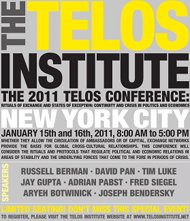A longer version of this essay was presented at the 2011 Telos Conference, “Rituals of Exchange and States of Exception: Continuity and Crisis in Politics and Economics.”
 The term “Excellence Critique” connotes a broad array of thinkers, including but not limited to Alisdair MacIntyre, Charles Taylor, Stanley Hauerwas, John Milbank, and Robert Spaemann.[1] While there are clear problems lumping these thinkers together, they share some important qualities. Two such qualities I shall discuss here.
The term “Excellence Critique” connotes a broad array of thinkers, including but not limited to Alisdair MacIntyre, Charles Taylor, Stanley Hauerwas, John Milbank, and Robert Spaemann.[1] While there are clear problems lumping these thinkers together, they share some important qualities. Two such qualities I shall discuss here.
First, none of these thinkers deny the successes of liberalism. All agree that liberalism generates the most “wealth” and “freedom” when these terms are measured via monetary success and moral relativism, respectively. Their argument is not one of efficiency; it is one of excellence. Liberalism, according to these thinkers, fails to fully embrace human flourishing. One way of understanding this failure, I will suggest, is via liberalism’s teleological deficit. By teleology I intend a shared, transcendental, and ineffable conception of the good.


